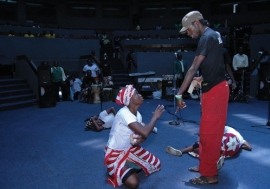The global COVID-19 pandemic has exacerbated the plight of many young girls in Africa by removing attention from old structural and cultural weaknesses.
In a small, far-flung village in the eastern part of Malawi, 16-year-old Martha Chiwalo sits on a reed mat outside her grandmother’s tiny hut as she takes a break from her routine household chores. It’s been months since she last went to school, as learning was abruptly halted to stop the spread of COVID-19.
Chiwalo now lives with her 70-year-old grandmother after her mother passed on five years ago.
Although Chiwalo would have wanted to join her peers whose parents can afford for them to attend private online classes during the lockdown, she knows her case is different due to lack of funds.
“All the same, I consider myself lucky because when the situation gets back to normal, I will be able to attend school since I have been put in a government-assisted programme, which supports orphaned children like me to get an education,” she told Africa Renewal.

However, apart from worsening an already dire health situation, the pandemic has also jeopardized the lives of young girls like Chiwalo. As of 30 September 2020, Malawi had 5,773 confirmed COVID-19 cases, 179 deaths and 4,263 recoveries, according to data by the Africa Centres for Disease Control and Prevention (Africa CDC). (As of 12 October 2020, Malawi had 5, 821 confirmed COVID-19 CASES, 180 deaths and 4,647 recoveries according to data by Africa for Disease Control and Prevention (Africa CDC)
As economic activities have been put on hold, it has become even more difficult for more families.
Even though non-governmental organizations, the media, and the government are doing all they can to educate citizens about preventing COVID-19, life for many people living in rural areas has not been easy.
“I wake up at dawn and walk a long distance to fetch water, more so to get into a queue for the water. It is not safe for drinking, but this is our only source of water here,” Chiwalo laments. The nearest clinic is 20 kilometres away.
With no money for fees, Chiwalo’s grandmother has chosen to give her granddaughter’s teachers maize or chicken in exchange for a few private lessons since she is in her final year in high school.
“On top of this, due to COVID-19, we now have to pay for new basics such as face masks, and more soap to wash hands,” she said.
In Zimbabwe
The situation is similar in neighbouring Zimbabwe where nurses and doctors had been on a go slow earlier this year and COVID-19 has severely affected healthcare, putting the lives of many in danger.
Rujeko Gwashure, a 26-year-old mother of two who is currently eight-months pregnant, is stressed out as she doesn’t know where she will give birth.
“Each time I give birth, I have to undergo a c-section yet till now I haven’t found a health centre where I can deliver safely. The private clinic is asking for US$1,000,” she told Africa Renewal.
Ms. Gwashure and her husband run a small business, buying and selling goods, but with the current restrictions on movement due to COVID-19, the family is now struggling to put food on the table, let alone pay for the cost of having a baby.
The impact of the COVID-19 pandemic on young women in rural areas was discussed at a virtual meeting organized by the Africa CDC on 10th July to look at on how COVID-19 was affecting healthcare services for young girls in Africa.
The virtual meeting was convened by Dorothy Njagi, the Strategic Communications Expert from the African Union Commission (AUC), Ifeanyi Okechukwu, the Executive Director for YouthRise Nigeria and James Ayodele, the Principal Communications Officer at the Africa Centres for Disease Control and Prevention (Africa CDC). The challenges impact more those in rural areas compared to those in urban settings.
Ms. Njagi, together with Mr. Okechukwu, concurred that COVID-19 has sadly overtaken existing social, economic and health care issues impacting young girls as governments and other players prioritize the pandemic.
Mr. Okechukwu noted that there has been a 30 per cent increase in cases of gender-based violence in Africa as the pandemic-induced lockdowns compel couples and families to spend more time than usual close to each other.
In addition, he noted that many families had lost their incomes and girls are not in school. There has also been a sharp increase in early marriages.
Furthermore, COVID-19 restrictions have crippled access to sexual, reproductive and other health services, resulting in some girls failing to access treatment for diseases and conditions other than COVID-19.
“There is a need for active community-based solutions and to ensure that young girls are educated to take well-informed actions on issues affecting them,” opined Mr. Okechukwu.
Meanwhile, Ms. Njagi emphasized the need for essential information to be communicated in the languages most easily understood by young girls to increase the effectiveness of educational efforts.
Discussions highlighted the need to provide services for young girls to ensure they are well-cared for. There were strong calls for government and policy makers to keep in mind the vulnerability of women and girls and for gender-inclusive approaches and programmes throughout the continent.




